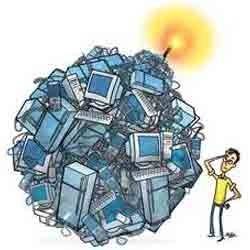What is Electronic Waste
Electronic waste turned into a global industry worth billions of dollars due to the rapid growth and popularity of home electronics, from laptops to smartphones to flat-screen televisions.
E-waste pertains to electronic equipment that has lost its value to their users or no longer satisfies their original purpose. The technological advances created a global challenge: what to do with e-waste?
according to The Global E-waste Monitor – 2017, E-waste added 44.7 million metric tons (49.3 million tons) of trash worldwide! Only 20% was officially tracked and adequately, despite that electronic waste contains billions of dollars' worth of precious metals and other valuable components.
Impacts On Human Health
The improper handling and composition of electronic waste affect human health. Epidemiological and clinical evidence on its impact are growing. The basic methods used by unregulated backyard operators (e.g., the informal sector) to reclaim, reprocess, and recycle e-waste materials expose the workers to several toxic substances.
Moreover, safety equipment such as gloves, face masks, and ventilation fans are virtually unknown in the informal sector. Workers often have little idea of what they are handling.
Environmental Impacts
Electronic waste causes air and water pollution. The informal sector often dumps toxic chemicals with no value elsewhere. In turn, it poisons the soil and affects the local groundwater quality. Eventually, the water becomes unfit for human consumption or agricultural purposes.
Moreover, dust particles loaded with heavy metals and flame retardants travel over long distances. The dust can also leach into the ground and cause both soil and water pollution.
From 44%, the world's population that have some national e-waste regulation increased to 66% in 2017. This jump is mainly due to India, which tightened its e-waste management rules in 2016. But this does not guarantee that the rules are strictly enforced. Even in other countries with rules, many still don't cover all kinds of e-waste.
It calls for enhanced efforts to develop e-waste policies and improve e-waste reporting as crucial steps toward correcting these deficits.



